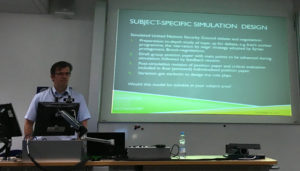
Today comprised an excellent set of sessions exploring the use of role play in teaching and learning with colleagues from Humanities, Social Sciences, and Engineering. I think the key aspect was the open attitude encouraged by the organisers and each speaker to both the typical positives (eg. very high attendance) and negatives (eg. some students are uncomfortable with ‘play’) of role play, so it felt like a very free flow of ideas.
Simon Usherwood joined us by Skype to present his ideas on "how to make fun useful" in the classroom. One question raised today was about whether students actually should have "fun" during their learning experiences. I think this was answered well by Frands Pedersen who pointed out that even if there is no additional pedagogical benefit, as long as there's no harm... why not? Other speakers pointed to additional benefits in more playful teaching and learning, which might not necessarily relate to the immediate assessments but would have more holistic plus points, including stronger group cohesion and deeper forms of learning. Frands had brought in a set of student designed board games including "Fight for Libya" and "Public Disorder: The London Riots", in which the police chase the rioters around the board, and it was obvious that these had engaged students effectively in understanding the key issues behind the actions of these two opposing groups.
We finished with a round table discussion on role play led by Felia Allum, drawing on her own experiences in teaching about organised crime through this method, bringing in the speakers from earlier and including reflections and ideas from Ben Bowman (PoLIS) and Kei Tsutsui (Economics) from their teaching contexts.
I really enjoyed today and it helped me reflect on my own attempts to run seminars in more interactive and stimulating ways. For example, I want to move towards having my student cohort take on the role of Congressional delegates. There is a balance to strike on the amount of information we should give to students on role-play opportunities - it might be more empowering and exciting for students to have a greater say in what role they play in any scenario and I will think further on this matter before implementation.
Respond